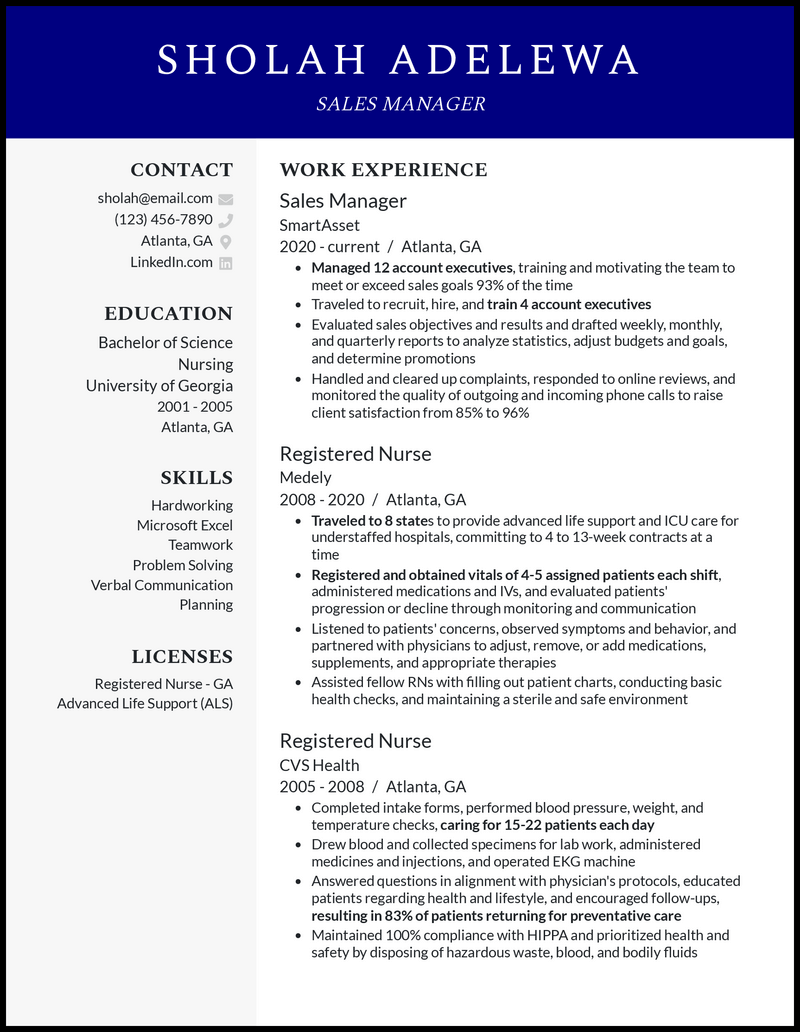Sometimes you reach a point where you’re ready to move between the RN job role and a totally different occupation that will make use of the professional abilities you already have. You’re totally ready to take the interpersonal communication, teamwork, and critical thinking knowledge from your RN experience and apply it to a whole new career!
But how do you build a resume for this unique career change? What do you include from your RN experiences, and how should everything look?
Not to worry: We’ve helped plenty of medical professionals with handy resume templates—and we can help you with these five RN career change resume examples and seasoned advice for writing cover letters, too.
Related resume examples
What Matters Most: Your Skills & Job Experience

When you’re listing your skills, think technical! Many of your soft skills can appear to overlap with other fields at first glance, but with a bit of creativity you can break them down into more detailed (and impressive) abilities that demonstrate your readiness for a career switch.
For example, listing something like “negotiation” is far more powerful than simply saying “communication”. You don’t want to repeat whatever the recruiter probably just read on nine other applications!
To really pack a punch with your skills, ensure that each one is specific to your new profession and super fine-tuned. List software programs by name alongside honing those interpersonal abilities.
9 most popular RN career change skills
- Negotiation
- Problem-solving
- MS Excel
- Planning
- Persuasiveness
- Active Listening
- Google Docs
- Salesforce
- Employee Training
Sample RN career change work experience bullet points
Recruiters are looking for someone who knows how to translate their skills into deliberate, impactful actions. Address your past role and cite examples of versatile skills from your previous job, like negotiation or employee training. Then, tie your accomplishments in with the new job you want.
The difference you made as an RN can still bolster your credibility in a new field: Just make sure you feature experience points that relate closely to your new job and demonstrate your positive impact in a way that translates well to the new role.
Oh, and always include quantifiable data to measure your impact! Metrics make all the difference between a nice success story and an impressive credential: Include transferable data like error reduction rates and client satisfaction percentages.
Here are some samples:
- Answered questions in alignment with physician’s protocols, educated patients regarding health and lifestyle, and encouraged follow-ups, resulting in 83% of patients returning for preventative care
- Assisted fellow RNs with filling out patient charts, conducting basic health checks, and maintaining a safe and sterile environment, reducing errors by 6%
- Handled and cleared up complaints, responded to online reviews, and monitored incoming and outgoing phone call quality to raise client satisfaction from 85% to 96%
- Managed 12 account executives, training and motivating the team to meet or exceed sales goals 93% of the time
- Evaluated sales objectives and results and drafted weekly, monthly, and quarterly reports to analyze statistics and adjust budgeting goals, reducing budget by 11%
Top 5 Tips for Your RN Career Change Resume
- Show steady development
- To simultaneously close the gap between your two career areas and showcase your ability to grow, feature a number of increasingly complex accomplishments on your resume. Show how you succeeded in your previous job role as an RN, and then share how you recently beat those metrics!
- Use a sleek template
- Pick a template that will organize your experience points in a visually pleasing and highly organized manner. Our templates all look a bit different once you fill in your unique info, so see which one fits best! You want to set off your overarching skills but also emphasize the advancement as an RN that’s prepared you for a career change.
- Keep bullet points brief
- Your bulleted list of RN experiences and achievements should be super easy for recruiters to skim. Keep each point to just one or two lines, and stick with just the essential information: What did you do for your patients? How did you do it, and why? What measurable results did you achieve?
- Utilize context
- The “why” of your experience examples involves a bit of backstory, especially if you’re switching from the RN role to a totally different job. By using examples that feature variety from one point to the next in terms of setting and motivation, you keep recruiters interested and show them your adaptability!
- Don’t run on
- Don’t let your resume go over one page, no matter how good the contents are! Recruiters are often working with a time crunch, so cut to the chase and share your best, most transferable RN experiences (especially anything connected to customer relations or the appropriate technical skills) as concisely as you can.
If you have some great points that you just don’t feel right about parting with, use them to write your cover letter! Be sure to grab RN experiences that demonstrate adaptability and connect strongly with the job ad you’re applying to.
Yes, absolutely! Even if you have a qualifying credential that doesn’t relate to your new career direction, like an ALS or RN certification, list it: This shows your ability to supplement traditional qualifications and get the training you need for any field.
Showing that you’ve read the job description can take you far: Do this by revisiting the original ad and finding skills, objectives, or mission statements you already align with. Reflect these back in your resume, with focus on your most recent relevant RN duties.










